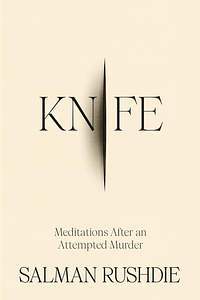Take a photo of a barcode or cover
emotional
hopeful
inspiring
reflective
medium-paced
emotional
hopeful
informative
reflective
medium-paced
Very well written — I loved listening to the audiobook as it’s read by the author. I don’t think I know enough about the author as an individual to fully appreciate/critique.
I cannot imagine experiencing what this author experienced, and it’s interesting to witness his process as to how he coped and worked through his trauma in his own way.
dark
emotional
informative
reflective
tense
medium-paced
A moving memoir that manages a balanced introspective, philosophical tone without being saccharine or deflecting toward diatribe. I haven’t read Rushdie’s fiction, so I can’t speak to how his style here compares to his other prose, but the style works well for a memoir. It is very personal but also conversational, avuncular, almost. There is a little bit of self-indulgence in the writing, but Rushdie doesn’t pretend otherwise and it feels both warranted and fitting. Yet, what I most appreciated is even within that there is a clear humility, at least in terms of his relationship with art and his dedication to embracing love as a driving force in his life.
He explicitly discusses how the writing of this book, while not therapy, was therapeutic and part of his continued recovery, and in that regard, then, I am happy to accept this book is exactly as it needs to be. It isn’t a perfect read, for me, though. There is an entire chapter dedicated to a series of imagined interviews with his assailant, and this really didn’t work for me, on an emotional level (which is to say it distanced me from my experiences he was guiding me through in the other chapters). Anyone who holds what they believe to be a morally or philosophically superior position to someone else believes they understand the key logic, the one statement that will dismantle their opponent and let them see the truth of reality. Of course, it never works that way—regardless of the veracity or persuasion of the argument—because beliefs are deeply held, often against common sense, and so there is always a retort, as unsatisfying as that may be. This chapter just felt like a chance for someone to just vent all these seeming “logic bombs,” and the imagined responses were always silence or vitriol, just evidence of how intellectually and emotionally moribund the assailant’s argument was. It isn’t that I didn’t find agreement with Rushdie’s ideas, but the whole thing felt performative, like it wasn’t a genuine (imagined) conversation with his assailant but one with belief in general, one where he is the uncontested victor. I think the chapter would have been stronger if he explained how he had had these imaginary conversations again and again and then gave us his ultimate position or take-away from them, in the introspective style of the rest of the memoir. As it was it just felt supercilious, contrasting with the overall tone and reading experience.
Aside from that chapter, it does seem Rushdie can’t help little supercilious jabs of his own throughout the book. He makes a declaration of his belief that personal faith and religious practice are well and good if they stay personal but when religion becomes weaponized or explicitly utilized in the public sphere it is harmful. And yet, he insists on inserting throw-away lines about how religions are imaginary, and so on. Basically, lines that show a marked disrespect for individuals’ private practices of faith, assertions of a moral superiority as someone who exists as a moral agent without relying on imaginary and fantastical beliefs. It is perfectly fine for him to hold this position, but it contradicts with his insistence that he is respectful of private practices of faith. Small statements to this effect are littered throughout the memoir and they served as a reminder that, while Rushdie insists that the “pompous Rushdie” is an invention of the British media it is not an invention cut from whole cloth but rather one that he actively contributes to, even in this memoir as he decries it.
To be honest, those moments of contradiction did take away from my experience of this memoir. Not because he is not allowed to believe what he believes, but because there is a contradiction between his explanation of himself and what these statements say about his self-understanding. A memoir, especially this one, is a deeply personal and reflective act, and to see these contradictions, though small, lent an air of disingenuity that I had to actively keep at bay. That is a type of work I didn’t want to have to do, because save for those few passages here and there I felt this was deeply moving. Rushdie manages to find personal closure while still holding space for the open-endedness not just of this particular event but of life, in general. He portrays what feels like an honest experience through pain and confusion to one of acceptance and growth, refusing to let his spirit be dampened by others’ ignorance or hatred. This is quite moving, and doesn’t feel fabricated but instead earned, and valuable. I also appreciate that while he does share some important understanding about his life and his place in the world and what kind of personal space he intends or hopes to occupy moving forward, understandings that maybe were latent in his mind before this attack but which find new growth and life and import in its wake, he doesn’t portray this attack as some sort of revelatory moment. There seems a public need to insist on Post Traumatic Growth, and he doesn’t play into that. He acknowledges how the attack helped reorient some of his thoughts and priorities, and he celebrates the growth he has had since the attack, but he doesn’t glamorize the recovery as revelation. Instead, he tells a deeply human story, a personal exploration of meaning, both in the individual and the global or universal sense. With clear and compelling language, friendly and inviting prose, he is able to walk us through a horrific tragedy only to end up in a place that celebrates humanity, and humanity’s best attempts at understanding itself through acts of art and love. It feels like a meaningful journey to take, and I am appreciative Rushdie was willing to share it.
challenging
emotional
reflective
fast-paced
Read for the Booktube Prize 2025.
While telling the reader in a very straightforward way how a murder attempt feels in your body and mind, Rushdie also manages to make the reader think about their own existence on the earth. Knife talks about crime, pain and ignorance but also about surviving through anger and self doubt.
Rushdie is professional writer and knows how to form beautiful sentences. For me the most memorable is how forgiveness is discussed and how forgiveness isn't always the answer. Do you need to know about Rushdie's life? Not really, because just as much the book is a detailed story about a violent incident and what in Rushdie's career led to that point, it is more a story about humanity and happenstance.
While telling the reader in a very straightforward way how a murder attempt feels in your body and mind, Rushdie also manages to make the reader think about their own existence on the earth. Knife talks about crime, pain and ignorance but also about surviving through anger and self doubt.
Rushdie is professional writer and knows how to form beautiful sentences. For me the most memorable is how forgiveness is discussed and how forgiveness isn't always the answer. Do you need to know about Rushdie's life? Not really, because just as much the book is a detailed story about a violent incident and what in Rushdie's career led to that point, it is more a story about humanity and happenstance.
emotional
inspiring
reflective
fast-paced
hopeful
reflective
slow-paced
I remember vaguely reading about the fatwa ordered against Salman Rushdie years ago and genuinely thinking “ah he’s gonna be fine.” As we know now, he was far from being fine… having been brutally stabbed in August of 2022, THIRTY years after the fatwa was first issued. This memoir is raw, vulnerable, even had laugh out loud moments. With immense strength, he never allows himself to be reduced solely into victimhood despite his near-death experience. Instead Rushdie reclaims power and even alters the power dynamic between himself and his assailant through their face-to-face conversations. I found myself in awe at his indomitable spirit and truly admire him greatly for walking his talk.
==========
“One has to find life, I said. One can’t just sit about recovering from near death. One has to find life.” On reclaiming his life back.
“What can’t be cured must be endured.” Of losing his eye in the attack.
”Don’t give him so much power, Suzanne. We aren’t so easily shattered. Don’t make him sound like an angel of doom. He’s just a dumb clown who got lucky.”
“When the faithful believe that what they believe must be forced upon others who do not believe it, or when they believe that nonbelievers should be prevented from the robust or humorous expression of their nonbelief, then there’s a problem.” On religious fanaticism
“I don’t forgive you. I don’t not forgive you. You are simply irrelevant to me. And from now on, for the rest of your days, you will be irrelevant to everyone else. I’m glad I have my life, and not yours. And my life will go on.” — Salman Rushdie’s last words to his assailant on their last visit after his recovery.
==========
“One has to find life, I said. One can’t just sit about recovering from near death. One has to find life.” On reclaiming his life back.
“What can’t be cured must be endured.” Of losing his eye in the attack.
”Don’t give him so much power, Suzanne. We aren’t so easily shattered. Don’t make him sound like an angel of doom. He’s just a dumb clown who got lucky.”
“When the faithful believe that what they believe must be forced upon others who do not believe it, or when they believe that nonbelievers should be prevented from the robust or humorous expression of their nonbelief, then there’s a problem.” On religious fanaticism
“I don’t forgive you. I don’t not forgive you. You are simply irrelevant to me. And from now on, for the rest of your days, you will be irrelevant to everyone else. I’m glad I have my life, and not yours. And my life will go on.” — Salman Rushdie’s last words to his assailant on their last visit after his recovery.










